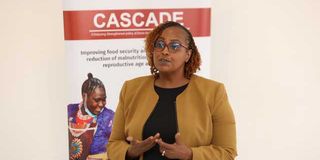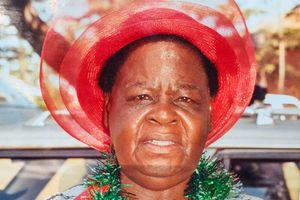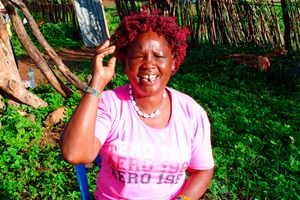
Mwende Kusewa, the Assistant Country Director in charge of Programmes at CARE Kenya.
Mwende Kusewa is the Assistant Country Director in charge of Programmes at CARE Kenya, the organisation spearheading the Catalysing Strengthened Policy Action for Healthy Diets and Resilience (CASCADE) project. The programme, run in partnership with the Global Alliance for Improved Nutrition (GAIN), operates in Nairobi, Nakuru and Nyandarua counties. She talks to Sammy Waweru about the project and the role of women in agriculture and fighting malnutrition.
What is the primary objective of the CASCADE project, and how does it aim to increase access to healthy diets and community resilience?
Launched in June 2022, the mission of the programme is to reach five million women and children across six countries in Africa, including Kenya.
The project uses a five-domain approach: strengthening policy implementation, promoting private sector innovation, empowering communities, focusing on women and improving coordination across sectors.
By advocating for nutrition policies, expanding access to nutritious foods and empowering women through programmes such as Village Savings and Loan Associations (VSLAs) and Farmer Field and Business Schools (FFBS), it aims to create sustainable and resilient food systems.
The programme also seeks to build a healthier and more resilient population in Kenya.
Why was the partnership between CARE and GAIN International formed? How do the unique strengths of each organisation contribute to the success of the project?
The collaboration between CARE and GAIN is important in addressing malnutrition. CARE brings expertise in helping women and marginalised groups through its VSLA and FFBS programmes, while also addressing gender-based barriers in agriculture. GAIN’s role lies in enhancing food security through market systems and policy advocacy.
Their complementary strengths ensure the project focuses on grassroots community interventions and tackles national policy gaps, creating a comprehensive approach to fighting malnutrition.
What approaches do you use to address malnutrition in the target communities?
We have adopted a variety of community-based strategies to tackle malnutrition. We train community health promoters in maternal, infant and young child nutrition, hygiene, food safety and other areas. These promoters serve as change agents in the community, promoting healthy practices and reducing diseases.
The integration of healthcare workers with the support groups ensures women have the resources and knowledge to improve their nutrition and well-being of their children.

Through the FFBS, we train small-scale farmers to grow diverse, nutritious crops that contribute to improved food security.
How do you incorporate diversity in farming production to promote healthy diets?
The project stresses agricultural innovation and nutrition-focused interventions to promote diverse and healthy diets. Through the FFBS, we train small-scale farmers to grow diverse, nutritious crops that contribute to improved food security.
Targeted value chains include African leafy vegetables, high-iron beans, dairy, poultry and garden peas.
We also encourage farmers to adopt a variety of foods to improve household diets.
What role does climate-smart agriculture play in ensuring food security?
Promoting sustainable farming practices like soil and water conservation, post-harvest handling and pesticide safety helps farmers enhance productivity while protecting the environment.
Additionally, we encourage the growing of drought-resistant crops and water-efficient farming techniques like mulching and rainwater harvesting.
These practices not only increase harvests but also reduce vulnerability to climate shocks, ensuring long-term food security for rural communities.
What are some of the nutrition-related policies your project is working with the national and county governments to implement? How will they improve access to healthier diets?
CASCADE collaborates with the national and devolved governments to implement policies that advance nutrition and agricultural development.
At the national level, the project supports three key policies – the Kenya National Nutrition Action Plan (KNAP), the Agricultural Sector Transformation and Growth Strategy (ASTGS) and the Kenya National Food Fortification Strategic Plan.
These policies aim to address malnutrition and promote modern farming.
We have adapted these frameworks into County Nutrition Action Plans (CNAPs), ensuring that national goals are translated into tangible improvements in local food security and nutrition.

Empowering women in farming requires addressing structural inequalities in resource access and decision-making.
With data showing that 65 per cent of women are engaged in agricultural production but only six per cent own land, what measures and policies should be taken to address these disparities?
Despite women contributing significantly to agriculture in Kenya, they face barriers in land ownership. The disparities can be addressed by advocating for legal reforms that support women’s land rights while promoting awareness of the importance of land ownership.
Through CASCADE, we use the Social Analysis and Action method to encourage dialogue, challenge harmful cultural norms and involve men as allies in the fight for women’s rights.
What steps should be taken to ensure women participate in agriculture and have decision-making power and access to resources like land?
Empowering women in farming requires addressing structural inequalities in resource access and decision-making.
Countries that promote gender equality experience better economic and social outcomes, underscoring the importance of equitable resource allocation. Implementing policies that support women’s access to land and other resources, challenging cultural norms and providing women with financial and leadership tools ensure women are not just participants in agriculture but leaders and decision-makers, driving transformative change in food security, nutrition and resilience.
How do you encourage women’s economic empowerment through programmes like village savings and loaning associations?
We promote economic empowerment by providing women with access to financial resources and skills.
The initiative includes financial literacy, entrepreneurship training and market linkages.
By fostering gender equality and promoting inclusive participation, the project has formed 314 village savings and loan associations with more than 5,600 members in Nairobi, Nakuru and Nyandarua.
The associations have collectively saved at least Sh7.9 million in the first year, enabling women to invest in farming inputs and income-generating activities.
Through these efforts, women are empowered to take on leadership roles, contributing to community resilience and sustainable development.







